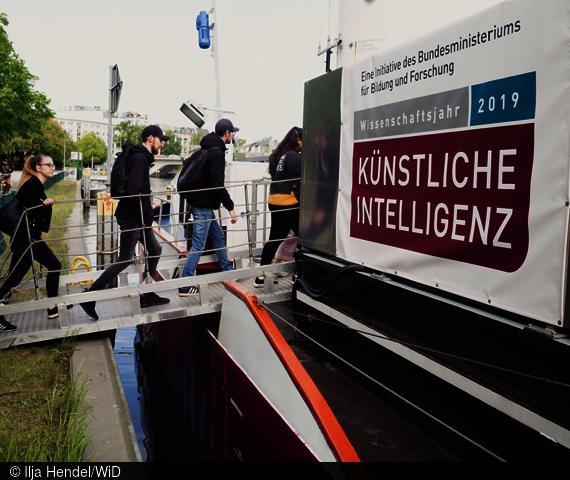Mannheim Ahoy! MS Wissenschaft at Anchor in Lindenhof
Dates and NewsZEW Exhibit on Artificial Intelligence on Board
The exhibition ship MS Wissenschaft will anchor on the Rhine promenade in Lindenhof from 2 to 5 September 2019. On board is the ZEW exhibit “Wie Künstliche Intelligenz Sprache und die Welt verstehen lernt” (“How Artificial Intelligence Learns to Understand Language and the World”), which provides insights into economic research using AI. On 3 September, Dr. Dominik Rehse, head of ZEW’s Junior Research Group “Digital Market Design”, will discuss from 6 p.m. on deck what’s inside the data.
Intelligent machines have become omnipresent in day-to-day life, and their fields of application are manifold, ranging from industry and medicine to science. How can artificial intelligence be of help to research? How does AI learn language and understand the world? What do scientists use AI for in their research? These are some of the issues addressed in the interactive exhibit developed by the ZEW Research Department “Economics of Innovation and Industrial Dynamics”, which will be on board the MS Wissenschaft in the context of the Science Year 2019 focusing on artificial intelligence.
Access to the exhibition in Mannheim
The exhibition on board the MS Wissenschaft offers a fun and interactive way for guests to gain insights into the world of AI through various exhibits. Everyone interested is cordially invited to visit the exhibition in Mannheim. It is aimed in particular at schools, young people and families and is suitable for children ages 12 and up. Entry to the exhibition is free. The floating science centre is open daily from 10 a.m. to 7 p.m.
The MS Wissenschaft is the centrepiece of the “Science Year 2019 – Artificial Intelligence”, an initiative launched by the German Federal Ministry of Education and Research, and Wissenschaft im Dialog (Science in Dialogue, WiD).
Science Year 2019 – Artificial Intelligence
Artificial intelligence is the theme of the Science Year 2019. Systems and applications based on AI are already part of our lives today. Just think of industrial robots that perform heavy and/or monotonous tasks, or smart computers that can process huge amounts of data in a short time. AI has therefore become indispensable for science and research. Not to mention virtual assistance systems that have become our everyday companions. Digitalisation and automation will continue to progress in the future. What opportunities do they bring? And what challenges do we have to face? What effects does this development have on our social interaction? In the Science Year 2019, citizens are called upon to enter into dialogue with researchers to jointly find answers to these and other important questions.


